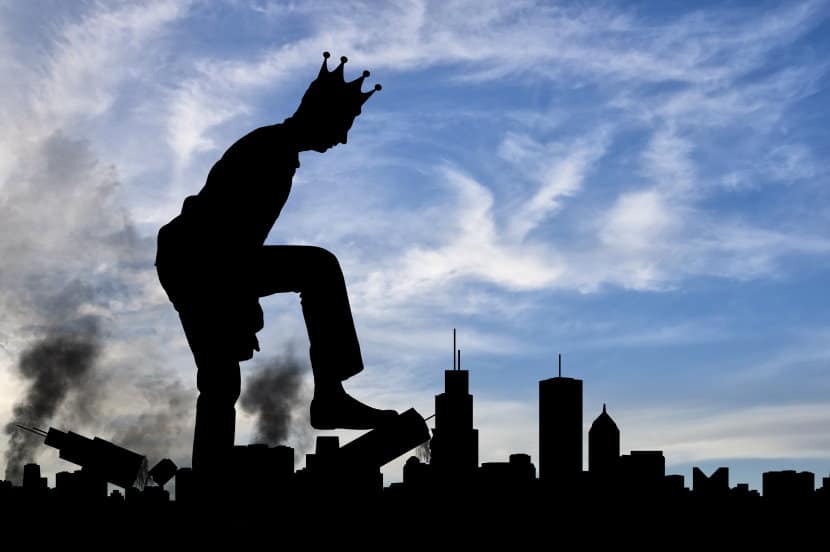Why Do Narcissists Tend Toward Authoritarian Politics?
*We may earn a commission for purchases made using our links. Please see our disclosure to learn more.
Recent political events around the world have revealed a tendency of narcissists to gravitate toward authoritarian politics. In fact, a number of different studies have shown this to be true, but exactly why do narcissists tend to prefer authoritarian politics? As with everything else about the narcissist, the answer is more complicated than you might think.
Narcissists tend to prefer authoritarian politics because of their defensive feelings of self-worth. They see other peoples’ actions as intentionally malicious. That, along with a need for external validation and to be at the top of the pecking order, makes them prefer strong, authoritarian leaders.
To truly understand the reasons for the narcissist’s political beliefs, you have to delve a little deeper into narcissistic personality disorder. Let’s explore the question of why narcissists like authoritarianism by looking at the research related to this topic. It’s a timely question that demands an answer as we witness the changing political landscape around the world.
What Draws Narcissists to Tyrants?

While narcissists appear secure in their opinion of their own worth, the reality is that their personality disorder masks their lack of a true sense of self. According to experts, a true self-esteem is able to sustain pride in the self autonomously without any external validation.
Typically, this so-called secure self-evaluation includes positive attitudes about other people in general. That generally means that people with this type of self-evaluation have the ability to trust other people and are willing to do so.
Narcissists, on the other hand, don’t have a secure sense of self-evaluation. While they seem to have positive feelings related to their own self-worth, those feelings are defensive as a result of their grandiose feelings of self-importance and entitlement.
As a child, the narcissist came to believe that their true sense of self was hopelessly flawed. They buried it underneath a strong sense of shame and self-loathing. They needed to construct a false self, however, in order to interact with the outside world.
They infused that false self-image with beliefs that they are omnipotent and omniscient in a desperate attempt to feel secure in their own worth. Unfortunately, their false self-image is unable to sustain those grandiose beliefs, and therefore, the narcissist needs other people to validate those beliefs and sustain their self-esteem.
That’s why narcissists tend to be exhibitionistic and are always trying to garner approval from everyone around them. Because they have told themselves they are unique and superior, they’re attracted to social hierarchies and strong leaders that could put them at the top of the pecking order.
Their overwhelming desire to achieve that lofty goal is threatened by people whose opinions differ from their own because these people can undermine their sense of infallibility. That’s why they like the tyrant.
How Does Personality Affect Political Beliefs?

Social scientists have long sought to tease apart the personality factors that influence a person’s political beliefs. When you understand the underpinnings of narcissistic personality disorder, you can begin to see why they are generally supportive of conservative leaders, even if they don’t always agree with their policies.
There are studies that have shown that open-minded, creative, and curious people are more likely to tend toward liberal politics. On the other hand, people who prefer orderliness and convention prefer conservative leaders. But just how does narcissism affect those ideas?
Research conducted at the University of Kent examined this question by dividing attitudes associated with right-wing politics into a belief in social dominance and inequality as inherent and right-wing authoritarianism. They defined the latter as the idea that it’s important to protect traditional values.
The research team conducted a survey of more than 2000 people in the UK, the United States, and Poland. The survey included questions related to determining the level of each person’s narcissism as well as questions designed to gauge their political attitudes.
They found that people who had higher scores for narcissistic attitudes also showed a preference for social dominance and ethnic prejudice. Interestingly, they scored lower on questions rating their preference for authoritarianism.
That might seem odd, but what it really shows is the narcissist’s need to be considered unique and special as well as their desire to be at the top of a pecking order. You can’t be at the top of a pecking order unless there is a pecking order to begin with.
Their need to be seen as unique and special also explains their tendency toward ethnic prejudice. They like seeing themselves as superior, and once again, you can only do that if someone is considered inferior.
So Why Do Narcissists Like Authoritarians?

A narcissist’s desire to be seen as unique means they will often break social norms; however, they desire to maintain an established social hierarchy so they can be at the top. This is in line with many authoritarian regimes where the leaders are themselves often narcissists.
In a world that is increasingly stressing the importance of tolerance and equality, the narcissist is far more likely to be drawn to the authoritarian than someone with a more liberal ideology. The authoritarian-leaning conservative leaders – think Trump here – often break those newly established norms heralded by liberals. They see themselves as rebels; something narcissists like to think they are too.
They seek to reestablish traditional values and the proper social hierarchy. In other words, they believe in social dominance with them at the top, of course. That’s also right in line with a narcissist’s dream.
How Does the Narcissist React to Opposing Beliefs?

Resistance to their beliefs is not something a narcissist likes. When they see someone as their enemy – whether real or imagined – they seek to do more than simply prove they are right. They seek to destroy the other person.
Thus, the right-leaning narcissist confronted with the liberal activist wants to destroy them thoroughly as they would any other perceived enemy. This is exactly how we see an authoritarian leader reacting to their enemies, political or otherwise.
That explains the tyrant’s tendency to imprison or even kill political opponents. They are crushing their enemies, and that so-called strength is seen by admiring narcissists as a desirable quality in a leader.
No matter the true social status of a narcissist, they still see themselves as being that dominant and domineering leader. They dream of crushing their own enemies in much the same way as the tyrant does. That explains their attraction to authoritarianism even if they don’t agree with the lack of freedom typically seen in such regimes.
The authoritarian’s ability to command the world stage and seem superior is another quality the narcissist admires and aspires to achieve themselves. They would love nothing better than to be the center of attention in the same way that Vladimir Putin has managed recently.
Despite the pushback from global leaders, in the narcissist’s eyes, Vladimir Putin is living the dream. The everyday narcissist sees him as exceptional, and that’s how they want other people to think of them.
Final Thoughts
Though it’s more complex than it seems, narcissists are attracted to the social dominance and attention-grabbing antics of authoritarian leaders. They like the idea of an established social hierarchy that will allow them to be at the very top. That’s consistent with the grandiose ideas they’ve infused into their false self-image.
While grandiose narcissists are obvious in their attempt to grab the spotlight and appear dominant, there are other types of narcissists. You’ll want to read my article on the different types of narcissism to gain valuable insights into how the type affects behavior.
--
If you want more tips for dealing with narcissists, setting boundaries, and managing emotional triggers, make sure you subscribe to my youtube channel




